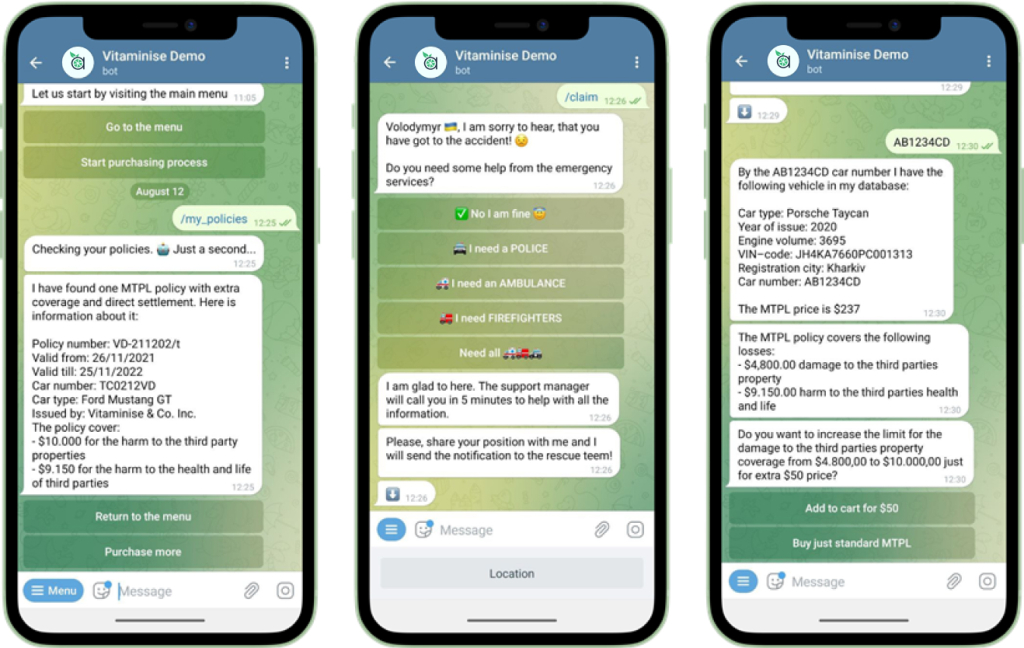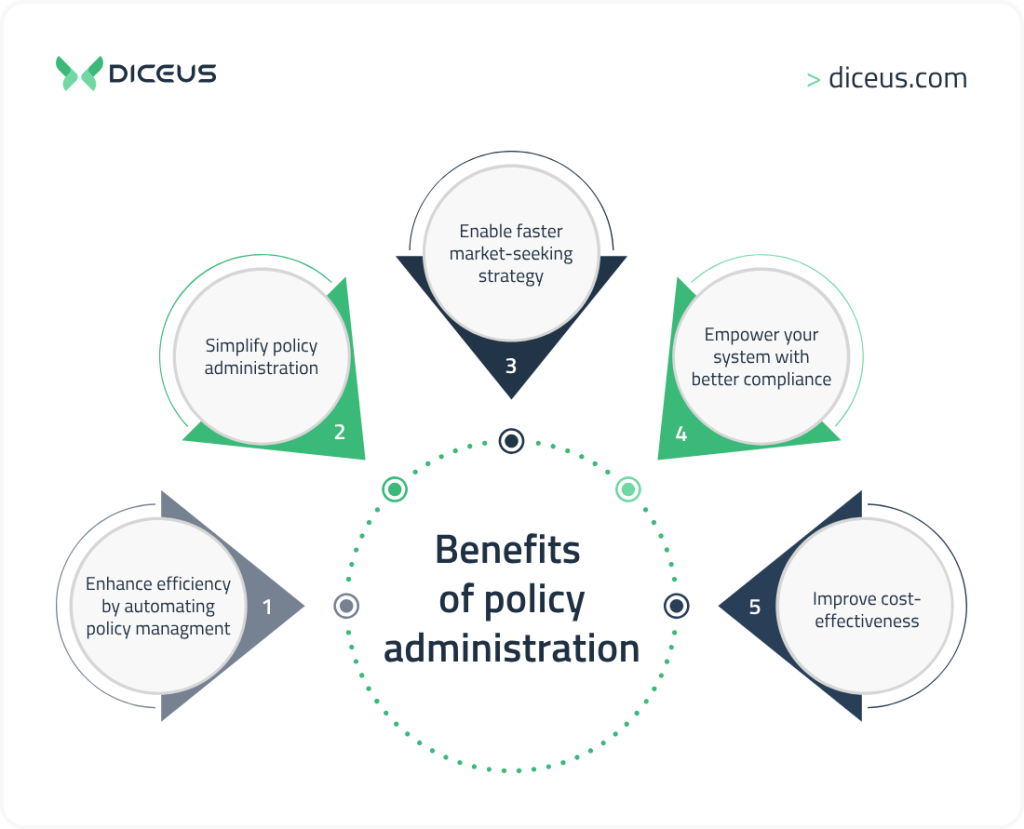

How to build insurance policy management software: 5 key tips
The rise of environmental, social, and governance (ESG) problems, changes in customer expectations, and rapid digitization encourage insurance companies to rethink their value proposition. To address these challenges, insurers invest in software modernization and new technology products.
In this article, we focus on insurance policy management software and the key tips for building it from scratch or modernizing it with advanced technologies.
What is an insurance policy management system?
Policy administration is a multitasking process ensuring that all the changes influencing the policy during its lifetime are made appropriately and in a timely manner. This process may vary across various business lines like life insurance, P&C, or H&A. However, a typical end-to-end policy management process includes stages and tasks such as quoting, assessing risks, underwriting, issuance, active policy management, claims management, renewal, cancellation, and termination.
As you can see, the process of insurance administration contains important stages that must be properly handled. Thus, all these stages are managed by dedicated professionals and special tools like insurance policy management software. The latter is a technological solution that allows the automation of the key processes of insurance administration, from policy issuance to its expiration.
How does the insurance policy management software work?
The insurance policy management system receives the required data from multiple sources: customer inquiries and the underwriting department. Leveraging the gathered data, the system automatically generates policy documents that are further kept in a unified repository. So, insurers can easily access the documents they need, track changes, and more. Some systems also offer self-service capabilities for the insured in the form of chatbots and mobile applications. These solutions allow customers to access and modify their policies on their own, without contacting a company or agency.
Want to enhance a policy management process? Check out our custom insurance policy management development services.
Key features of insurance policy management software
If you are looking for the most effective insurance policy administration software, you need to learn about the core features of such systems. As a rule, these systems include the following modules:
Quoting
Modules for quotes help carriers estimate correctly what a person’s rate could be. The right quoting can be ensured by collecting as much relevant information about the potential policyholder as possible. Quotes and premiums offered by insurance providers are also based on some statistics data provided by underwriting departments.
Policy issuance
This feature allows for generating different types of policy-related documents like custom templates and forms, business rules, corporate/personal lines forms, etc. Besides, it’s possible to integrate this feature with third-party apps to effectively use data. Usually, such tools provide the opportunity to import data in different formats.
Renewals
The renewals feature helps carriers notify policyholders about the need to update their coverage a few weeks prior to the due date. Today, self-service solutions like mobile apps and chatbots allow insured people to renew their policies online. The process is quick and simple. Typically, users are to enter some of their credentials to access their accounts. All other information is already available there, so a person has no need to communicate with an agent.
Claims management
Modules for processing claims help automate a complete claims life cycle. Bespoke solutions usually offer advanced options for managing requests. For example, a person can attach an image or video of the car damage for assessment with an AI-powered solution. Unique features built with the help of advanced technologies like AI, ML, and NLP, such as image, voice, and video recognition, are gaining popularity among insurance companies. These modern capabilities help insurers differentiate and don’t lag behind insurtech companies.
An insurance company can enrich its policy management system with the technologies mentioned above. However, first off, they need to conduct thorough CX research to understand which unique features and customized solutions will bring the most value.
Claims management is one of the core processes in the P&C sector, along with life insurance, health insurance, and employee benefits. Thus, this process requires special attention, and custom insurance policy management software will be the best way to add more useful features.
Customer service
This module is responsible for diligent customer servicing. Today, customers want instant responses to their requests. That’s why many insurers consider customer experience automation with AI-fueled chatbots and mobile apps. Digital channels offer people many self-service options, such as submitting a claim, modifying a policy, accessing FAQs, appointment scheduling, and more.

Agents and managers, in turn, can focus on more critical tasks. This way, insurance companies can reduce operational costs, automate workflows, and provide excellent CX.
Need a custom solution for the insurance industry? Learn more about custom AMS insurance software.
What’s better: Custom or out-of-the-box insurance software?
When it comes to choosing the best insurance software, businesses have two alternatives: to build a bespoke system from scratch or to buy an off-the-shelf product. Both options have advantages and disadvantages. Let’s compare the two options.
Out-of-the-box insurance systems cost less than custom solutions. They are available immediately for implementation. However, unlike with bespoke products, you will have to pay annual or monthly fees to use ready-made apps.
Off-the-shelf insurance policy management software provides many core features. Unfortunately, often customers don’t need as many functions as the software provides. Instead, they may require some specific features to meet their business goals and customer expectations. It’s possible with bespoke solutions. Before the project development phase, analysts conduct a feasibility analysis to define the main challenges and make up a list of requirements.
Custom policy administration systems are more scalable and flexible. For example, in DICEUS, we build insurance software regarding the growing number of users. We also consider the increasing number of new products developed by carriers.
Related content: Custom software vs off-the-shelf: What is the main difference
More about the benefits of custom software in the insurance industry
Custom-developed insurance administration solutions can benefit both insurance customers and their clients significantly. The biggest advantage of custom insurance policy management software is its ability to be complemented with as many features as necessary. Once you choose off-the-shelf products, you are limited to the standard list of functionalities. On the contrary, bespoke products can be easily integrated with advanced technologies and tools like image and voice recognition, human-like communication assistants, robotic process automation, and more.

Benefit 1 – Enhanced efficiency with automated policy management
Straight-through customer inquiry and claim processing is one of the main focuses of any insurance company. For example, implementing OCR (optical character recognition) tools and turning papers into electronic documents will help you organize data in the most efficient way, eliminate redundant and manual jobs, and decrease administrative costs significantly. Chatbots can improve customer experience by communicating with clients and providing them with instant guidance and answers to their questions.
Benefit 2 – Simplified policy administration
Good policy administration software can eliminate highly repetitive processes. For example, RPA (robotic process automation) tools can help automate different tasks in document management, generate templates, and develop insurance products.
Need software development? Check the differences between the onsite and offshore model of development.
Benefit 3 – Faster insurance product development
Modern insurance systems allow for effective product development and rapid market entry for new insurance products. Newly created products are easily defined within a standardized framework.
More about the life insurance software product development process
Benefit 4 – Better regulatory compliance
Modernized insurance systems and the most sophisticated policy administration products ensure regulatory compliance with data gathering and operating workflows.
Benefit 5 – Improved cost-effectiveness
Current technologies offer intelligent solutions to manage different tasks remotely. For example, advanced policy management software can be developed for mobiles. Mobile corporate solutions allow employees to give a timely response to customers or access the right information from any place and at any time.
Learn more about business benefits of custom software and solutions for insurance. Explore Vitaminise.
How to build insurance policy management software or modernize the current system
Here are two cases of how insurance companies can improve the insurance policy administration process. The first one is developing a system from scratch if the company still doesn’t have any software, and the second case is transforming the current solution.
Case 1: Build insurance policy administration software from scratch
Let’s start with a typical development life cycle. You’ll need this information if you plan to get a custom app. Here’s how it works:
- You provide your on-site or offshore team with major requirements for the project.
- Based on your request for a proposal, a dedicated team will give you detailed technical design specifications.
- Once you approve an SRS document, a team will be able to start developing a project.
- In terms of Agile development, a team provides testing and quality assurance services to ensure that the product is fully functional and free of bugs.
- The developed solution can be further integrated with third-party applications and implemented on the client’s site.
- The last checkpoint is support and maintenance. The dedicated team is able to deliver highly scalable products and provide 24/7 support.
Need custom insurance software? Check out our expertise in IT services and solutions for insurance.
Case 2: Transform a current insurance policy management system
If your system still requires manual efforts, think of digital transformation. DICEUS provides professional services to change your legacy software. Here’s how it works:
- Tell us about the existing system. We will discuss all the current problems you have. You tell us what you want to see in a modernized version.
- Our business analysts conduct research on what changes your system needs.
- We provide a list of new requirements for the project along with deliverables and specifications.
- After approval, our developers start working on the project.
- We test every module or feature to ensure high performance and data accuracy.
- Our engineers deliver and implement fully compatible policy management software.
If you are running an agency, you might be interested in our insurance agency management software development services.
5 tips to choose the best software for insurance companies
Picking up the right software is always a daunting task. Here are some tips for selecting the best-suited software package for your business.
Tip 1 – Learn about different alternatives
First, you should start with market research. You should know about the different options offered in the software market. Traditionally, insurance companies use software divided into off-the-shelf products, suites, and custom software. Off-the-shelf systems and apps that are part of larger suites often offer basic features, while custom apps are usually more specialized.
Tip 2 – Make a list of your demands
A well-structured list of software requirements will help you greatly. First, you’ll discover exactly what you actually need. Second, you’ll know what end-users need. Third, you’ll have a list of initial requirements for potential vendors. Based on your list, they can provide you with specifications. If that is found to be insufficient, they can conduct a deeper business analysis to detect the company’s needs.
Tip 3 – Look for reliable vendors
Your next step will be to find a trusted software engineering company or a dedicated team. We recommend searching for vendors on verified platforms like Clutch or Good Firms. There, you’ll be able to read about the firm’s history, focus industries, and number of employees. You’ll also find some information about the technologies used by developers. Finally, portfolios. You can look through various projects that a company has accomplished.
Tip 4 – Double-check all the deliverables
Once you have signed an agreement, check if you have all the functionalities and features in the list of project deliverables. Did you include policy administration, claims management, and communication management? What about other functionalities? Intuitive design, user-friendly interface, and mobile app. You should discuss all these things beforehand.
Tip 5 – Communicate with your team
If you decide to create an application from scratch, you will probably choose a dedicated team that knows how to develop insurance policy management software. Dedicated teams work best for long-term projects, and this model is good if you plan to make any changes. If you choose dedicated developers, you should keep in touch with them regularly. Define the best means of communication and project management to track the project’s progress.
Read more about life insurance quoting software that every agent must have.
DICEUS insurtech case
One of our focus industries is insurance, so we’d like to add some helpful information about our latest case to this article. It will help you familiarize yourself with how custom development works for the insurance market.
We developed the Insubiz solution for our technology partner, who specializes in delivering state-of-the-art software to captives, agents, brokers, and other insurance product providers.
Our key goal was to create a platform able to simplify and streamline administrative tasks and processes. To realize this goal, we created a detailed roadmap that included the following components:
- Technology roadmap
- Clear communication
- Professional project management
- Risk management
As a result, our developers built a system that offers clients effective coverage and cuts operational costs. The final product incorporates different features that can manage risks, claims, policies, and incidents. It can also control the budget, track data, make reports, and manage workflows.
The system was developed according to the L&F (look and feel) approach to design. We tried to consider all principles of user-friendly interfaces and intuitive design. Our team consisted of 10 experts, including a project manager, back-end developers, front-end developers, and test engineers.
Searching for ways to improve risk assessment processes?
Learn more about custom insurance risk management software.
If you want to learn more about insurtech solutions and custom development, feel free to ask our experts. They can answer your questions, recommend the best-suited technology, and consult on modernization. Besides, we have extensive experience in creating sophisticated systems from scratch for different industries. We are ready to offer you the most professional, dedicated team for your business domain.
FAQ
Why should insurance companies consider developing custom policy management software?
Insurance companies implement bespoke solutions as they can be fully aligned with the company’s business processes, integrated with other systems, and complemented with modern technologies and advanced features.
How can custom policy management software improve the efficiency of policy creation?
Custom solutions can streamline the entire process, from drafting to approval. By providing customizable templates, automated workflows, and centralized document storage, such software eliminates manual tasks and ensures consistency across policies. It enables collaboration among stakeholders, facilitates version control, and offers real-time tracking of changes, thereby reducing the time and effort required for policy development while enhancing accuracy and compliance with regulatory requirements.
Can custom insurance policy management software integrate with claims management systems?
Yes, tailor-made software can integrate seamlessly with claims management systems to optimize overall operational efficiency. Integration allows for the sharing of data between the two systems, enabling a smooth flow of information from policy creation to claims processing. By synchronizing policy details with claims data, insurers can expedite claims processing, reduce errors, and enhance customer service. This integration ensures that claims are handled accurately and efficiently, leading to improved client satisfaction and streamlined internal processes for insurance companies.
How can custom insurance policy management software enhance client communication?
Custom life insurance policy management software can enhance customer service by providing personalized and timely interactions. Through features such as client portals and chatbots, insurers can keep clients informed about policy updates, renewal reminders, and important notices. Moreover, the software can facilitate two-way communication, allowing clients to submit inquiries, access policy documents, and request changes conveniently. By centralizing communication channels within the software, insurers can ensure consistency, responsiveness, and transparency, thereby fostering stronger relationships with clients and improving overall satisfaction.
Can custom policy management software support different types of insurance policies?
Yes, custom policy management software can support various types of insurance policies by offering flexibility in customization and configuration. These software solutions are designed to accommodate the specific requirements and complexities of different insurance lines, including property and casualty, life, health, and specialty insurance. Through customizable templates, configurable workflows, and adaptable data structures, the software can cater to the unique characteristics of each insurance product, allowing insurers to manage policies efficiently across diverse lines of business. Additionally, robust reporting and analytics capabilities enable insurers to gain insights into the performance of different policy types, facilitating informed decision-making and continuous improvement.





